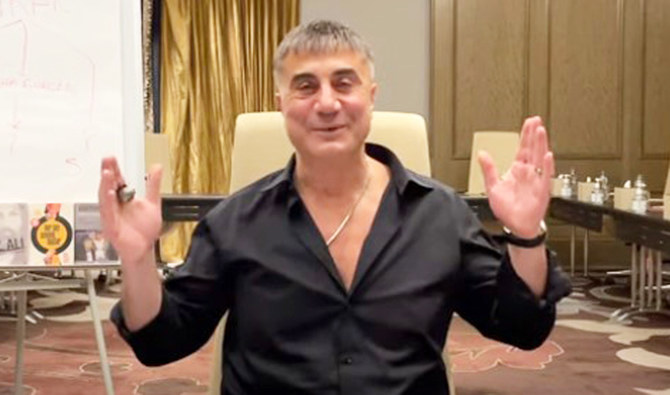ANKARA: The bombshell revelations of Turkey’s exiled mafia boss Sedat Peker on his YouTube channel have triggered an in-depth look into the country’s deep-state apparatus. At the center of the trials are Mehmet Agar, a former interior minister and police chief, and Korkut Eken, a former intelligence official.
To what extent the Turkish government will handle the serious accusations against its high-profile politicians and whether Interior Minister Suleyman Soylu, who is at the center of claims on state-mafia relations, will resign are still matters of concern. No parliamentary inquiry has been launched yet.
Agar and Eken will be retried over 18 extrajudicial killings that occurred in the 1990s after an appeals court decided to reverse their acquittals in a ruling that was adopted on April 5 but surprisingly conveyed to lawyers on Sunday.
The appeals court asserted that the evidence, especially the bullets used in the murders, was not suitably examined.
Agar and Eken made headlines recently with the allegations by organized crime boss Peker, who accused them of committing several unlawful acts under the state apparatus, including involvement in an international drug-smuggling scheme and the assassination of investigative journalists Ugur Mumcu and Kutlu Adali during their terms.
Journalist and peace advocate Adali was shot dead in front of his home in July 1996, in the Northern Cyprus administration. The murder has remained unsolved.
Adali’s spouse filed a case with the European Court of Human Rights against Turkey, and in March 2005 the court found that Ankara had not conducted a proper investigation into the murder of the Turkish Cypriot journalist.
On Monday, Turkish police detained Atilla Peker, brother of Sedat, after he said he assigned his brother to a botched mission to kill Adali 25 years ago upon orders of the state.
Mumcu, a globally known investigative journalist, was also killed by a car bomb in January 1993 outside his apartment in the Turkish capital of Ankara. Peker claimed it was Agar who stepped in first to the crime scene.
Sinem Adar, associate at the Center for Applied Turkey Studies at the German Institute for International and Security Affairs, said that the state-mafia organized crime triangle is not new in Turkey.
“Still, one key difference in the current moment is the degree of institutional deterioration and fragmentation of power within the state, which together wipe away even the pretense that allegations would be investigated,” she told Arab News.
“In fact, except for a few officials from the ruling Justice and Development Party (AKP), we have so far not heard from the president implying that any serious investigation will take place,” she said.
In order to clear his past before entering politics, Agar allegedly killed all Kurdish businessmen from whom he was receiving money in return for drug dealing.
Among the businessmen allegedly slain by the former minister, there is Savas Buldan, husband of Pervin Buldan, the pro-Kurdish Peoples’ Democratic Party co-chair.
The Kurdish lawmaker is set to apply for the re-launching of a judicial process over the killing of her husband.
Tolga Agar, Mehmet’s son and a lawmaker from the AKP, was also accused of having raped and killed a Kyrgyz journalist who filed a complaint with the gendarmerie about the lawmaker just a day before she was found dead.
According to Adar, Peker’s allegations and revelations demonstrate that the state-mafia organized crime triangle is no longer a secret that surprises many when it comes out in the light.
“It is rather a public performance through which parties show each other their power, audacity and sometimes even their panic — a performance that slaps one in the face as the very evidence of political and institutional decay,” she said.
As Peker pledges to continue whistleblowing on his past ties with the highest echelons, this will be a serious litmus test for the Turkish government to demonstrate its public relations skills for containing this unprecedented political crisis and take decisive actions against the criminal underworld ahead of elections in 2023.
BACKGROUND
• Sedat Peker, who lives in Dubai, has been making headlines and shaking up social media with his claims about prominent political figures in Turkey.
• His videos aim to reveal his deep connections to the government and also seek revenge against those who discredited him in favor of rival mafia leader Alaattin Cakici.
• Peker’s videos have become so famous that IMDb has listed all the ‘episodes’ as a TV mini-series under the topics of biography, crime and reality TV.
One thing is clear: This latest wave of allegations will seriously undermine the approval ratings of the government in the long run as it has already lost considerable public support recently, with the opposition mayors of Ankara and Istanbul rising as potential challengers.
As for the likely implications of the revelations and allegations on the electoral behavior, Adar noted that the AKP, as well as its far-right ally the Nationalist Movement Party, have been steadily losing popular support.
“This decline is not reversible. No doubt about it. Peker’s allegations are, in this sense, another hit to an already losing alliance,” she said.
“More than the electoral support, however, the damage reflects itself more in terms of solidifying and accentuating the already existing conflict and competition among different cliques within the ruling alliance,” Adar added.















